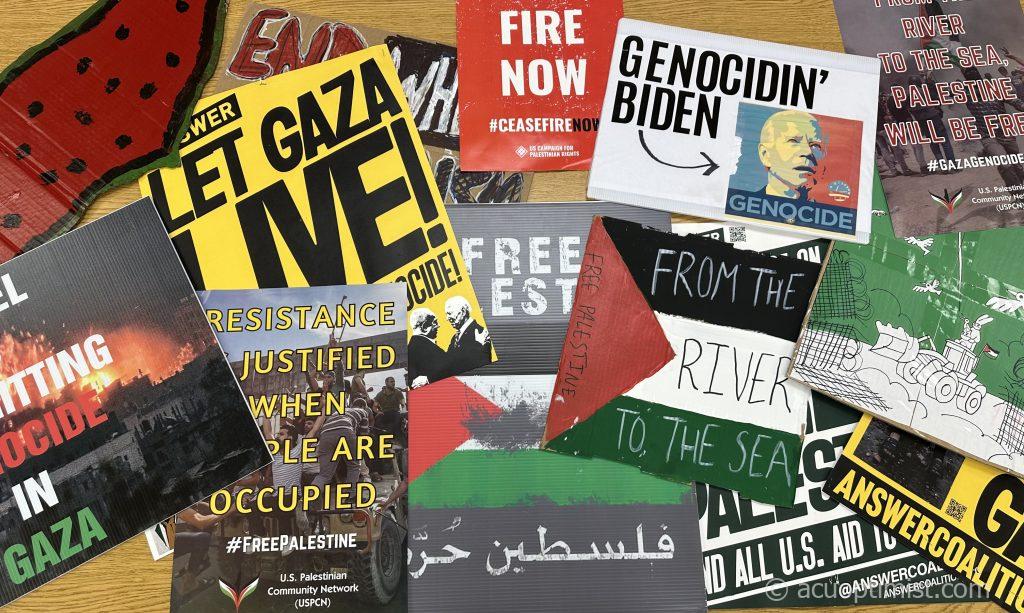Worry. Confusion. Fear. These are emotions that consume people when processing the concept of war. A student wants answers to peace and looks for it in family, friends, and leaders of the community.
Students want answers to their questions and ACU has provided a platform for this.
Because of how fast the attacks were and the intensity of other country’s involvement, ACU students have become worried about what it means for them and others in their communities. This has led to a discussion in Hart Auditorium and organizations on campus and professors to discuss the war.
On Oct. 17, a discussion was held titled: How Long, O Lord: A Spiritual Conversation about the War in Israel and Palestine. This discussion featured speakers like Dr. Randall Fowler, Dr. Mark Hamilton, Dr. Ben Peterson, and Dr. Candice Ortbals-Wiser. Dr. Jon Camp was the moderator. This discussion hit several points including the history of the Palestinians, definitions of both groups and their involvement in the history, a look into Hamas and identifying if it is a terrorist group or if it is heading in that direction, and what it means for people of faith.
“We wanted to be a kind of spiritual conversation as well and not just from a raw political analysis or historical analysis,” said Peterson, associate professor of political science.
Along with this discussion, there have been others on campus within organizations. ACU College Republicans have talked about the factual events that are happening, but also what it means to be a student on a Christian campus. The organization’s leaders sent a statement in support of Israel.
“We view our faith as the source of our perspective,” said Emma Jaax, senior accounting and finance major from San Antonio. “We are sad to see the loss of life and sad to see an attack on someone for nothing beyond their history and their beliefs.”
Other discussions have been with professors and students in passing. People are worried on campus and ACU has resources to talk about these concerns. These resources are in response to the past few weeks of violence and destruction.
The Israeli-Palestinian conflict has witnessed attacks and retaliation for a long time but has progressed in recent months. It started with a surprise attack from Hamas on Israel on Oct. 7, which led to thousands dead. The attack was an estimated 2,200 rockets fired toward southern and central Israel. After the strikes, Hamas stormed the blockaded areas and killed civilians. Israel’s response was to strike Gaza by jet fighters carrying and dropping rockets. There, over 10,000 were killed. This ended up in being a 7-weeks of fighting between these two parties.
“If there is anything that people need to know about October 7, it is that Iran ordered Hamas to attack Israel so that Israel would turn around and have to be involved in a war in which Palestinians were killed to derail the normalization process with Saudi Arabia,” said Neal Coates, department chair for political science and criminal justice.
Hamas is a militant Palestinian group that seeks to resist Israel. The surprise attack on Israel was to free Palestinian prisoners and help oppose restrictions on Gaza, which the Hamas currently controls as well as the normalizing relations.
After Oct. 7, there were more attacks from both parties. Armed Hamas terrorists breached the border security fence separating Gaza from Israel and gunned down its civilians in their homes and attacked soldiers. The Israel Defense Forces began a campaign of retaliation. The soldiers bombarded Gaza airstrikes, and Israel declared its intent to eradicate Hamas.
The Hamas-run Gaza Health Ministry has said more than 14,000 people have been killed and 35,000 have been injured. The Israeli prime minister’s office said that more than 1,200 people have been killed in Israel, with over 6,000 injured. Over 300 defense forces soldiers are also dead.
On Nov. 22, Israel’s Cabinet approved a deal to release 50 hostages over a four-day pause to fighting. 150 Palestinian prisoners will be released with the hostages. The hostages and prisoners are women and children. Three hostages were Americans.
Israel also added that the ceasefire would be extended by a day for every 10 additional hostages released. This deal was negotiated between Hamas, Israel, Qatar, and the United States.
Students can reach out to professors for questions about what is happening and what it means for them in the ACU community.
Statement from College Republicans:
“We, the ACU College Republicans, stand with Israel and support their struggle to protect their people, borders, and their way of life. All of us have watched with horror as Hamas has unleashed war on Israel and the Jewish people. We grieve for those who have been killed, particularly the tragic death of innocents on both sides. As we witness the shocking amount of anti-Semitism and support for the actions of Hamas, we also condemn those who have publicly justified the actions of Hamas. Hamas’s terrorist atrocities are pure, unadulterated evil and have shown a complete disregard for the sanctity of human life. While territorial disputes may be ongoing and complex, no amount of complexities can condone the actions of Hamas. Our thoughts and prayers are with the Israeli people, the innocent Palestinians caught in the crossfire, world leaders, and all those affected by this crisis. We pray that God’s divine presence and protection surround this conflict. Thy kingdom come, thy will be done. “


